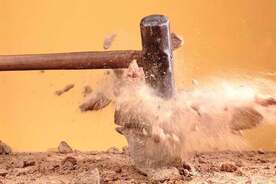 A few years ago while we were still living in Florida we discovered that for the price of a couple Starbucks drinks a week we could outsource getting our yard work done. I guess there were some perks to having a small yard! While the idea of letting someone else mow and weedeat in the oppressive humidity of a Florida July sounded awesome, we ended up deciding not to. It wasn't a financial decision, it was a sanity decision. I need to mow my grass. Not because I can do it better, or that I can do it faster. But I needed to do it as a way of replenishing my soul and decompressing for a bit. All of this is fresh too as I stare out my living room window at the yard I mowed and the fence I pressure washed. Pastors, can I offer this bit of counsel to you? If possible, cut your own grass. It gives your mind a break - So much of what we do in ministry is mentally taxing. It's not necessarily physically taxing, although the hours and days can be long. As I heard one pastor say about counseling young men to ministry "It has its advantages, it's an inside job without a lot of heavy lifting." The weariness of a week in ministry often comes from the mental toll. Sunday preparation is tough and is an all-consuming mental (and emotional and spiritual) exercise. Don't believe me? Try preaching the minor prophets sometime. Cutting your grass helps give your mind a break. I love it. Go one way in a straight line, turn the mower around, and come back the other way in a straight line. Repeat as necessary. It engages your body - Again, a lot of this I say as someone who's in full time vocational ministry. It can be a largely sedentary job, a lot of sitting. Getting a sweat, getting some steps in, and exercising your body for a while does nothing but good to your heart. And sweat I've found often has a healing property to it, that we can sweat out our stresses and the weights we carry around us. It's a job that can be finished - This was the biggest thing I remarked about when we were trying to decide to outsource yard work or not. I don't love it. But I need it. So much of ministry is unfinished business. Sure Sundays come and go and you have to have your message ready in the can. But you'll never "finish" preaching. You'll never finish staffing. There will always be things to deal with. You'll never finish counseling. There will always be crises. You'll never finish discipleship. There will always be growth opportunities. You'll never finish financial management. There'll always be something that breaks. What I love about cutting my grass is that when it's done, it's done. I can step back, see the lines in the yard, and be done. It's a project. And I can finish it. What do you do that helps you disengage your mind for a bit? Is it woodworking? Is it golf? Is it something else? Or do you find the same satisfaction I do in seeing a nicely mowed lawn?
3 Comments
 A while back I was talking with a colleague in ministry and we were talking about lessons we've learned in pastoring and serving in churches. I quipped "I feel like of all the things I've learned is that 75% of pastoring is just not being a jerk." I'll be honest, it was a throwaway line. I didn't think much of it except that I've seen way too many jerks in churches shipwreck their ministries, discourage and damage the church, and leave ripple effects that are still there long after they've left. Since then I've reflected more on it, and really believe there is something to the simple statement of "don't be a jerk." Most of the wounds that we take in ministry, and I say this from firsthand experience, are self-inflicted. It's not that someone is taking shots at us, it's that we're punching ourselves in the face and then wondering why our nose hurts. One of the easiest ways is just not to be a jerk. Jerks use their sermons as a cannon, not a banquet - The time we're preaching is an opportunity for us to bring spiritual food to the church. We've spent all week preparing and studying, we've crafted the menu and we're lifting the lid to present them with a spiritual meal to sustain them, help them grow, strengthen them, comfort them, challenge them, and help them be more like Jesus. Jerks use their sermons as a chance to take shots at people, or passive-aggressively deal with things without naming names or using vague illustrations. Jerks view their team as disposable, not resources - I say this primarily to those who are in first chair positions, the ministry team (staff and volunteers) around you are an asset, a resource, and a blessing. I think about the times I've been the new guy and how helpful those established staff members were to navigate things as simple as "where's the nearest Chick-Fil-A" to more complex things like "Why don't those two people get along?" Jerks look at their team as disposable pieces who are at best a tolerable nuisance and at worst a threat to their position. Jerks view sheep as a threat - The image of a pastor is that of a shepherd, one who provides for and cares for the sheep. Sure the sheep may bite occasionally and nip our hands, but by and large our calling as shepherds is to come alongside the sheep and invest ourselves in them. Good shepherds are willing to get dirty, to do hard things, and occasionally get nipped by a sheep because they love the sheep and want the best for them. Jerks look at the nipping sheep as a threat, and the non-nipping sheep as a potential threat. They're not concerned with providing for the sheep or caring for them, they want the sheep to serve them and view people as a roadblock to ministry.  Jerks think everything is a nail and hammer accordingly - There are times that a pastor's toolbox needs a hammer, and times that we exercise strong leadership, even confrontational leadership. But a good shepherd sees what tool is required and uses the right one for the purpose. Jerks look at fragile glass as a nail and themselves as the hammer. Of course what happens is destruction. Hammers aren't meant for fragile glass. Finally, jerks don't see themselves at fault, it's always someone else - The street prophet Taylor Swift nails it when she sings "It's me, hi, I'm the problem. It's me." There's a lot of wisdom to take from that to own up to our faults, to own our mistakes. Sometimes an event that we plan and pour ourselves into tanks. It just happens. A good shepherd will look at that and learn from it, recognize their own faults and mistakes, and grow from it. A jerk is going to look for someone else to blame because it couldn't possibly be them. Pastors, be a good shepherd. Don't be a jerk. And if you are a jerk, there's no better time than now to do a heart check and get help to be the shepherd and leader God wants you to be. |
Scott M. DouglasA blog about leadership and the lasting legacy of family ministry. Archives
August 2023
Categories
All
|
 RSS Feed
RSS Feed



